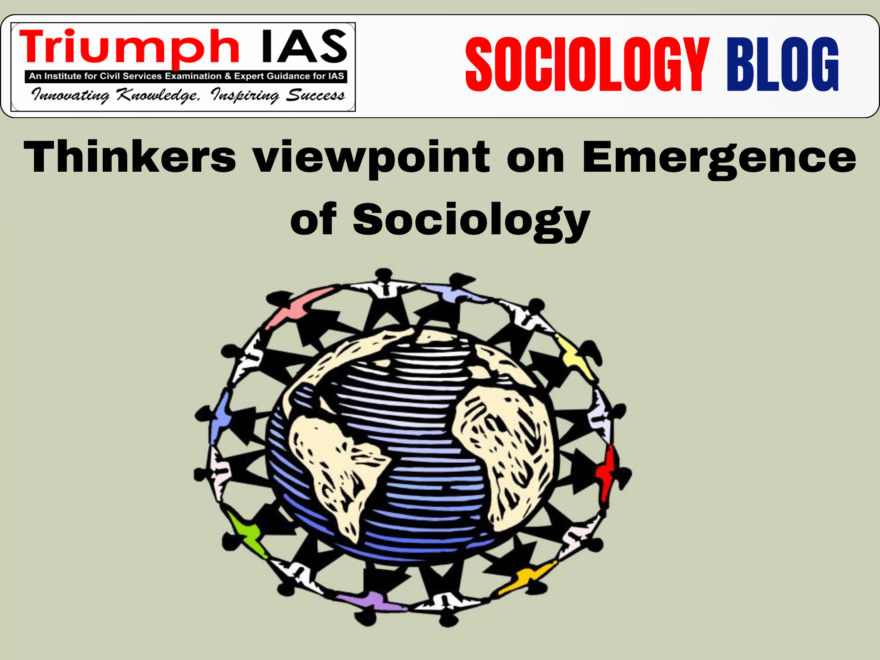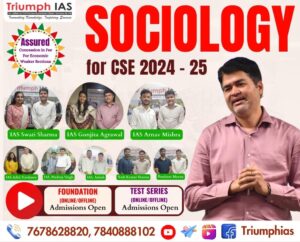Thinker’s Viewpoint on Emergence of Sociology
Relevant for Sociology Optional for Civil Service Examination.
Relevance : Sociology Paper -1
Unit – SOCIOLOGY DISCIPLINE
Thinker’s Viewpoint on Emergence of Sociology
-
- “Sociology is one of intellectual product of French Revolution.” Peter Burger
- Science can be used to build a better world: Auguste Comte
- Society like human body, has interrelated parts, needs, and functions: Emile Durkheim
- Modern living strangers are considered are not really conceived as individuals, but as strangers of a particular type: George Simmel
- Different societies appropriate the materials of modernity differently: Arjun Appadurai.
- The challenge of modernity is to live without illusions and without becoming disillusioned: Antonio Gramsci
- The philosophers have only interpreted the world……the point is to change it.: Karl Marx
- Early sociology was developed as reaction to enlightenment. : Zetline
- Sociology was both event pushed and thought propelled.
- Modernity is an unfinished agenda.: Habermas
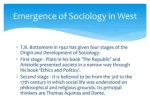
Popularity Of Sociology
-
- As an established discipline, however, Sociology is a relatively new arrival on the academic scene, and the real expansion in its popularity has occurred in the post war period. We can point to some factors that have influenced this expansion.
- In the Post-war period there has developed a rather more critical awareness of how societies operate. Very few people accept their societies unthinking. They see that alongside many technological and social advances that have been made so far, there still exist problem areas like over-population, poverty and crime.
- Alongside this, there has developed an increasing concern with social reform and the reordering of society, accompanied by the belief that in order to make such reforms effective knowledge about society and its members is needed.
- There has also developed an increasing awareness of other societies and ways of life because of better systems of communications in travel and the mass media.
- Increasingly, it has been claimed that people who work in government, industry, the social services etc ought to have some sort of specialist knowledge of society on the grounds that they will be better equipped to meet the demands of their work.
- Emergence of new nation states was accompanied with rapid modernization. Therefore there was increasing awareness among these societies that they need to understand social life scientifically in order to ease the process of nation building.
As a result, during and since the 1960’s, sociology degree courses have increased considerably, Sociology has found its way into schools, sociologists have been increasingly recognized and consulted by various organizations, from national government downwards, in research programmers, policy, planning etc. and some sociologists have also found fame in the national media.
Thinker’s perspective on Common sense and sociology
-
- Emile Durkheim: Common sense was deceptive, unrealistic, untestified and speculative.
- Andre Beteille: Sociological knowledge tends to be general, if not universal; on the other hand commonsense knowledge is particular and localized.
- Peter Berger: “The fascination of Sociology lies in the fact that its perspective makes us see in a new light the very world in which we have lived all our lives. It can be said that the first wisdom of Sociology is that things are not what they seem”..
- Goffman: Common sense is knowledge used by people to make judgements and navigate their way around the world.
- Antony Gramsci: Common sense thought lies with masses while theoretical with elites.
- Hegel: All philosophy gradually develops from the ordinary day to day consciousness. Thus an ordinary person is social theorist.
- Anthony Giddens: sometimes sociological knowledge also itself becomes a part of common sense knowledge.
- Moore and Reid: common sense and science together used to expand man’s understanding of truth .
- John Madge : every scientific enquiry starts with common sense knowledge.
- Ronald Fletcher: science is reflection of common sense knowledge.
Various thinkers on Sociology and Economics
-
- John Stuart Mill: he defines the subject of economics in a social context as –“ the science which traces the laws of such of phenomenon of society as arise from combined operations of mankind for production of wealth , in so far as those phenomenon are not modified by pursuit of any other object.”
- Max Weber’s ‘Wirtscharaft and Gesellschaft’ is the classical attempt to bring some of the concepts of economic theory within the frame work of general sociology. He also deals with cause and effect principle which is commonly found in economics and the various policies related to it. For example , his study of spirit of capitalism and the rise of Protestantism .
- James Steuart: he introduced many essential elements of society in Economy , such as family , population, social interactions, and exchange , which are subject matters of sociology.
Various thinkers on Sociology and History
-
- E H Carr: in his book “What Is History” argued that the more sociological history becomes, and the more historical sociology becomes, the better for both.
- W. Mills : The sociological imagination enables us to grasp history and biography and the relationship between the two in a society.”
- Karl Marx : historical materialism propounded by him is based on historical perspective.
G . E. Howard : history is past sociology, sociology is present history. “History provides the perspective to locate present society on a continuum of man’s present, past and future.
Reference: Static Portion
Related Blogs…
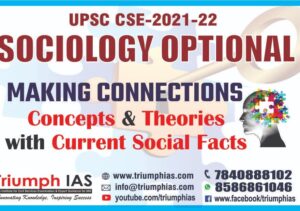 |
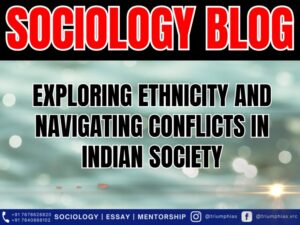 |
Frequently Asked Questions:
1. Question: Define the term “ethnic movement” and provide an example from India.
Answer: An ethnic movement refers to a collective effort by a group sharing common cultural, linguistic, or religious traits, seeking to assert their identity and rights; an example from India is the Khalistan Movement in Punjab.
2. Question: Identify the main objectives behind the Gorkhaland ethnic movement.
Answer: The Gorkhaland ethnic movement primarily seeks to establish a separate state for India’s Nepali-speaking population in the Darjeeling region, advocating for linguistic and cultural recognition and political autonomy.
3. Question: What was the Operation Blue Star, and which ethnic movement was it related to?
Answer: Operation Blue Star was a military action in 1984, aiming to remove Sikh militants hiding in the Golden Temple in Amritsar; it is related to the Khalistan movement, which sought a separate Sikh country.
4. Question: Mention a critical factor that triggered the emergence of ethnic movements in India, as discussed by Dipankar Gupta.
Answer: Dipankar Gupta emphasized that ethnicity is fundamentally a political process, wherein caste and religion, the key components of identity formation, are politicized by leaders for vested interests.
5. Question: What were the primary reasons for the Assam Ethnicity conflicts involving Bodo tribals and Bengali Muslim settlers?
Answer: The Assam Ethnicity conflicts primarily stemmed from issues related to immigration, land rights, and resource allocation, leading to clashes, riots, and evolving relationships among indigenous communities to address challenges.
6. Question: Briefly describe the role of the Dravidian Movement in terms of caste and societal structure.
Answer: The Dravidian Movement, led notably by E.V. Ramasamy, aimed to establish an egalitarian society, focusing on anti-Brahmanism and advocating for equal rights for backward castes, while also introducing reforms like self-respect marriages.
7. Question: Name the prominent ethnic movements in North-East India and specify one common objective.
Answer: Prominent ethnic movements in North-East India include the Nagas’ and Mizos’ struggles; a common objective was to gain autonomy and recognition for their distinct tribal identities and cultural uniqueness.
8. Question: What is the key argument of Gail Omveldt regarding traditional Indian society and multiculturalism?
Answer: Gail Omveldt opposed romanticizing traditional Indian society, arguing that hierarchy has always dominated it and dismissing the notion that multiculturalism is an intrinsic feature of Indian society as a myth.
9. Question: Briefly explain the social hierarchy factor as a contributing element to ethnic movements as suggested by Olzak.
Answer: Olzak suggests that the construction of hierarchies among ethnic communities, which often leads to the suppression of one group by another, is a key factor that can instigate social and ethnic movements.
10. Question: Identify one consequence of the unequal economic development factor within the context of ethnic movements in India.
Answer: One consequence of unequal economic development is the marginalization and underdevelopment of certain groups, leading to feelings of alienation and sometimes initiating ethnic movements as these groups strive for equality and recognition.
GS Related Practices Questions…
To master these intricacies and fare well in the Sociology Optional Syllabus, aspiring sociologists might benefit from guidance by the Best Sociology Optional Teacher and participation in the Best Sociology Optional Coaching. These avenues provide comprehensive assistance, ensuring a solid understanding of sociology’s diverse methodologies and techniques.
META TAGS:
Ethnic Movements, ethnic movements in india, ethnic movement in sociology, Punjab Movement, North-East Ethnic Movements, Gorkhaland Movement, Dravidian Movement, Assam Ethnicity, Ethnic Conflicts, Sociopolitical Impact, India, Ethnic Consciousness, Ethnic Rights, Political Crisis, Economic Development, Cultural Disparities, Khalistan Movement, Nagaland, Mizoram, Multiculturalism, Political Economy, Identity Formation, Social Hierarchies, Bodo Tribals, Bengali Muslim Settlers, Anti-Sikh Riots, Operation Blue Star, Unequal Development, Ethnic Violence, Political Mobilization

Why Vikash Ranjan’s Classes for Sociology?
Proper guidance and assistance are required to learn the skill of interlinking current happenings with the conventional topics. VIKASH RANJAN SIR at TRIUMPH IAS guides students according to the Recent Trends of UPSC, making him the Best Sociology Teacher for Sociology Optional UPSC.
At Triumph IAS, the Best Sociology Optional Coaching platform, we not only provide the best study material and applied classes for Sociology for IAS but also conduct regular assignments and class tests to assess candidates’ writing skills and understanding of the subject.
Choose The Best Sociology Optional Teacher for IAS Preparation?
At the beginning of the journey for Civil Services Examination preparation, many students face a pivotal decision – selecting their optional subject. Questions such as “which optional subject is the best?” and “which optional subject is the most scoring?” frequently come to mind. Choosing the right optional subject, like choosing the best sociology optional teacher, is a subjective yet vital step that requires a thoughtful decision based on facts. A misstep in this crucial decision can indeed prove disastrous.
Ever since the exam pattern was revamped in 2013, the UPSC has eliminated the need for a second optional subject. Now, candidates have to choose only one optional subject for the UPSC Mains, which has two papers of 250 marks each. One of the compelling choices for many has been the sociology optional. However, it’s strongly advised to decide on your optional subject for mains well ahead of time to get sufficient time to complete the syllabus. After all, most students score similarly in General Studies Papers; it’s the score in the optional subject & essay that contributes significantly to the final selection.
“A sound strategy does not rely solely on the popular
Opinion of toppers or famous YouTubers cum teachers.”
It requires understanding one’s ability, interest, and the relevance of the subject, not just for the exam but also for life in general. Hence, when selecting the best sociology teacher, one must consider the usefulness of sociology optional coaching in General Studies, Essay, and Personality Test.
The choice of the optional subject should be based on objective criteria, such as the nature, scope, and size of the syllabus, uniformity and stability in the question pattern, relevance of the syllabic content in daily life in society, and the availability of study material and guidance. For example, choosing the best sociology optional coaching can ensure access to top-quality study materials and experienced teachers. Always remember, the approach of the UPSC optional subject differs from your academic studies of subjects. Therefore, before settling for sociology optional, you need to analyze the syllabus, previous years’ pattern, subject requirements (be it ideal, visionary, numerical, conceptual theoretical), and your comfort level with the subject.
This decision marks a critical point in your UPSC – CSE journey, potentially determining your success in a career in IAS/Civil Services. Therefore, it’s crucial to choose wisely, whether it’s the optional subject or the best sociology optional teacher. Always base your decision on accurate facts, and never let your emotional biases guide your choices. After all, the search for the best sociology optional coaching is about finding the perfect fit for your unique academic needs and aspirations.
To master these intricacies and fare well in the Sociology Optional Syllabus, aspiring sociologists might benefit from guidance by the Best Sociology Optional Teacher and participation in the Best Sociology Optional Coaching. These avenues provide comprehensive assistance, ensuring a solid understanding of sociology’s diverse methodologies and techniques. Sociology, Social theory, Best Sociology Optional Teacher, Best Sociology Optional Coaching, Sociology Optional Syllabus.
Best Sociology Optional Teacher, Sociology Syllabus, Sociology Optional, Sociology Optional Coaching, Best Sociology Optional Coaching, Best Sociology Teacher, Sociology Course, Sociology Teacher, Sociology Foundation, Sociology Foundation Course, Sociology Optional UPSC, Sociology for IAS,
Follow us :
🔎 https://www.instagram.com/triumphias
🔎https://www.youtube.com/c/TriumphIAS
🔎https://t.me/VikashRanjanSociology
Find More Blogs…
| Compare and contrast Karl Marx’s and Max weber’s | Karl Marx- Historical Materialism |
| Talcott Parsons : Social system | Scope of the subject and comparison with other social sciences |
KEYWORD:Emergence of Sociology,Emergence of Sociology ,Emergence of Sociology ,Emergence of Sociology ,Emergence of Sociology ,Emergence of Sociology ,Emergence of Sociology ,Emergence of Sociology ,Emergence of Sociology ,Emergence of Sociology ,Emergence of Sociology ,Emergence of Sociology ,Emergence of Sociology ,Emergence of Sociology ,Emergence of Sociology ,Emergence of Sociology ,Emergence of Sociology ,Emergence of Sociology ,Emergence of Sociology ,Emergence of Sociology ,Emergence of Sociology ,

